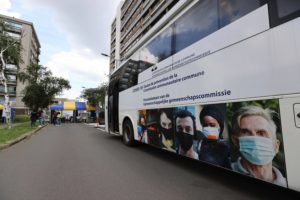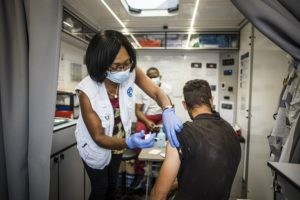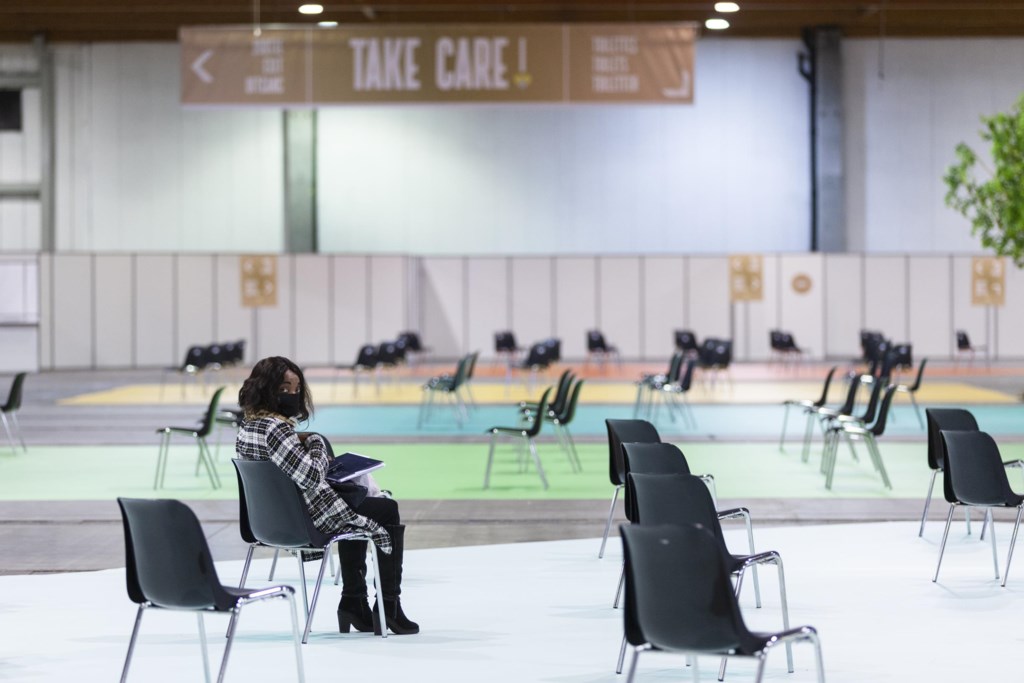Belgium has one of the highest vaccination rates in the world, but in Brussels – particularly the poorer neighbourhoods on the west side of the canal – the numbers are shockingly low. Maïthé Chini joins the Vacci-Bus mobile teams crisscrossing the city to find out why there are still vaccine holdouts
"At first, neither of us wanted to get vaccinated because we read a lot of scary things about how it would cause fertility issues or problems when you’re pregnant, and we really want to have children," says 28-year-old Samira.
One Monday in October, Samira was walking with her 27-year-old fiancé Rachid, when they were approached by staff from a Vacci-Bus, a mobile vaccination unit that travels to various sites in the city. The staffers chatted with them, asked why they were didn’t want a shot, and then suggested some useful websites. "We were still unsure, but they told us the bus would be at Saint-Josse-ten-Noode until the end of the week,” Rachid adds. “We discussed it at home and, well, now we are here.”
The Vacci-bus is just one of the tools Brussels is using to bring the vaccines to the people, instead of the other way around, using the one-shot Johnson & Johnson version so the process is completed on the spot. (In the meantime, Belgium decided to give a booster dose to all those who received the J&J vaccine.) It’s an unusual measure, but the authorities know they have some catching up to do.
Although Belgium is one of the most vaccinated countries in Europe, with a total coverage of 75 percent (87 percent of adults), Brussels is well below the national average, with just 56 percent fully vaccinated (69 percent of adults).
While the main wave of inoculations took place in spring, in sports centres and other major spaces, 60 percent of current vaccinations in Brussels are made through the buses and other local initiatives, says Inge Neven, the head of the Brussels health inspectorate (Cocom), which is responsible for the region’s vaccination.
"Less than 40 percent of vaccines still happen in our vaccination centres, but we are putting a lot of effort into decentralised, local actions to bring the vaccines as close to the people as possible," she says. "We try to raise awareness and give people the correct information first and hope to vaccinate them afterwards."
Vax in the city
That first move, giving people information, is crucial, as much of the vaccine hesitancy is due to the vast swirl of misinformation about the process. Take Angela, a 56-year-old at the Vacci-Bus in Saint-Josse-ten-Noode, who says she resisted the jab because her friends said the pharmaceutical companies making the vaccines skipped the testing phases, and the government was using them to experiment on the population.

Credit: Belga
"My daughter had been telling me for a while that this was not true, but it wasn't until some people I knew had gotten the shot and were completely fine afterwards, that I actually started considering it,” she says.
But despite the reassurances from the Vacci-Bus teams, many people still believe a lot of myths, as Inge Neven points out. "The fertility issues and the concerns that the vaccines were supposedly made too fast come back a lot," she says. "But people are also concerned that getting a shot will alter their DNA, that the government is implanting a chip in their arm, or they are afraid of unforeseen side-effects in the long term. Now, many people are also wondering how effective the vaccines actually are, especially now that the elderly are getting a third dose."
Individual Vacci-Buses can vaccinate between 50 and 150 people every day, which is relatively meagre, but it is slowly bringing the Brussels rate closer to that of the rest of the country.
Flanders has a particularly high rate: 80 percent is fully vaccinated (92 percent of adults), and Wallonia is also doing better than Brussels, with 70 percent fully vaccinated (82 percent of adults).
These numbers also mask local variations. Within the Brussels region, it ranges from around 71 percent (around 83 percent of adults) being fully vaccinated in well-off municipalities like Woluwé-Saint-Pierre, Watermael-Boitsfort, Auderghem and Uccle, to barely 45 percent (around 55-60 percent of adults) in poorer, western neighbourhoods of Anderlecht, Saint-Josse, Koekelberg and Molenbeek.
There is a striking correlation between wealth and vaccination: the Sciensano figures for rates across the 581 Belgian communes are very similar to those of Statbel on annual incomes. Brussels communes account for six of the 10 poorest in the country, and nine of the 10 least vaccinated.
Marginalised communities and protest voters
This is a logical correspondence, according to sociology professor Ignace Glorieux from Brussels’ VUB university. “Disadvantaged people participate less in public life, especially anything organised by what you might call mainstream,” he says.
“You need to target those disadvantaged people specifically, with organisations and community workers, for example. This is what Brussels is trying to do now. But as a rule, underprivileged people participate less in such initiatives, and this is the same with vaccination.”
Glorieux says there are many reasons why poorer, marginalised communities might be harder to reach. Some just don’t speak the language, or if they do, might not understand the terminology, or the instructions. Others might not bother to open their mail. Or they have low-paying jobs with long working hours and might not have the time to go to a vaccination centre.

Credit: Belga
“Additionally, there is generally more distrust among poorer people, towards everything that comes from the government, or everything that is considered official,” he adds. “They often have bad experiences with the authorities, such as the police, schools, and all institutions that are related to administration. They are less familiar with them, which in turn makes them more suspicious.”
Distrust can be further fuelled by rumours, misinformation and conspiracy theories on social media. “Underprivileged people are also more susceptible to those conspiracy theories and fake news, precisely because they are - often understandably - more distrustful of regular media,” Glorieux says.
He also identifies some vaccine refuseniks as people taking a resistance stance against mainstream society, like protest voters at elections. “With protest votes, people often vote against their own best interests, yet they feel it is the only way to make themselves heard. It could well be that the same is happening here with vaccination,” Glorieux says.
While some of the unvaccinated can be persuaded, Glorieux says that it is almost impossible to win over those entrenched in their ideological silos. "The louder you shout that we are all in this together, and that it is important for everyone to get vaccinated, the harder they will resist."
He says the only way to change their minds is through confidants, people who can mediate between residents and authorities, like social workers. "These are the people who they know will help them when they need it, who they trust,” he says.
The cup of coffee method
This is also the way that Médecins sans Frontières (MSF), Samusocial, Médecins du Monde and the Red Cross approached the Mobivax campaign to vaccinate the most vulnerable population in Brussels. Between May and September, Mobivax vaccinated some 2,000 homeless people, migrants, undocumented people, and people in shelters.

© Olivier Papegnies MdM
"We never forced anybody,” says Julien Buha Collette, MSF's Head of Mission in Belgium. “Just like in the general population, there are doubts and questions. That is why we really put the emphasis on first giving them the right information and then providing the time for them to process this information.”
In practice, they organised specific sessions on the spot, and said they would come back the following week, so people had some time to think about it. "By the time next week rolled around, people had often already approached us with some extra questions which we could answer. Like in the rest of society, some myths, misunderstandings and misinformation were going around. That had to be tackled," Buha Collette says.
"As mediators, I think it was really important to go to where the people are, to explain, have a coffee together, try to understand people's motivation a little and answer some questions."
In May, Mobivax was the first initiative in Belgium and the first to offer access to vaccination regardless of people's administrative status. But as the campaign went on, they persuaded the main vaccination centres to open to everybody in Belgium, not just those with the correct documents or papers.
“A lot of effort is still needed to remove potential administrative obstacles,” says Buha Collette. This can mean adapting services to provide information that is explained in a simpler, clearer and more engaging format.
Together, these initiatives are gradually raising the vaccination rate in Brussels. "It is going slower than we had hoped, but there is progress. The work is not finished,” says Buha Collette.

